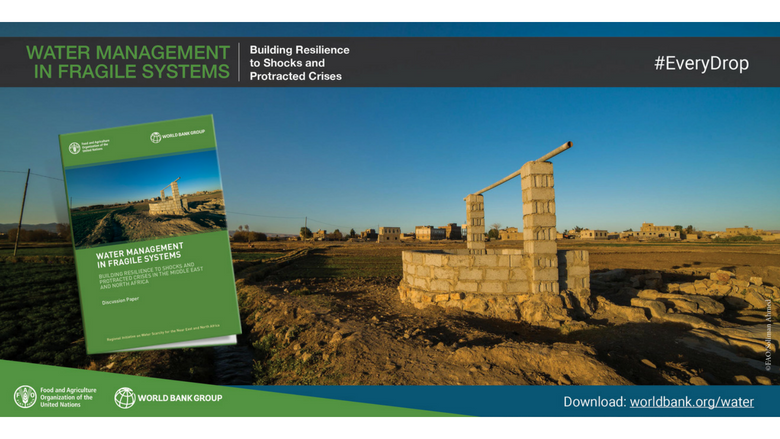Key Findings
THE VICIOUS CYCLE OF WATER AND FRAGILITY
· The Middle East and North Africa water challenges are intensifying. Rising demands,
climate change, inter-sectoral competition and urbanization are exacerbating the region’s age-old water scarcity challenges. In some countries of the region, poorly adapted governance structures and distorted incentives mean that these challenges are largely left unaddressed and actions and policies are not sustained. Distortions in policies and institutions have created a system that does not recognize the value of water.
· The scale of the challenge is unprecedented. Countries in the Middle East and North Africa have been at the forefront in developing practices and institutions to manage scarce water resources in the context of a largely arid and highly variable climate. However, the scale of the current water crisis is unprecedented and requires coordinated responses across institutions in many locations.
· Failure to find solutions to water challenges aggravates fragility. Water crises strain the ability of individuals and societies to maintain livelihood security and political stability.
· Fragility makes it harder to address water issues. Fragile situations – characterized by weak and ineffective institutions, histories of conflict, unsustainable livelihood systems and decaying or damaged infrastructure – compound challenges to sustainable water management.
· The compounding nature of water and fragility gives rise to a vicious cycle. In this vicious cycle, fragility makes it more difficult for water management to be effective, in turn amplifying the negative political, social and environmental consequences of water-related challenges. At the same time, as water issues are left unaddressed, their impact increases, eroding government legitimacy and destabilizing fragile contexts.
· Don’t blame the drought. We don’t claim that there are direct causal linkages between water crises, social tensions and unrest, migration, or other manifestations of fragility. But what is clear is that institutions and policy choices can mediate water-related impacts on people and economies. In the meantime, water-related challenges can amplify fragility risks when policy design and implementation do not adequately promote sustainability, inclusion and resilience.
WHAT CAN BE DONE?
· Addressing water and fragility challenges requires a move from a focus primarily on immediate, reactive responses to a balanced long-term approach. This approach would build growth-oriented resilience to shocks and protracted crises focused on sustainable, efficient and equitable water resources management and service delivery.
· Use decentralized, participatory approaches. Because of the essentially local nature of water and agriculture problems, community consultation, participation and ownership are vital, as is working with whatever local government may exist on the ground.
· Invest in innovative policies and practices. Research, technology development and transfer can provide further improvements to water efficiency and crop productivity in the region.
· Working together within countries and across boundaries is essential. Given the scale and commonality of the challenges, the relatively small size of many countries in the region and the transboundary nature of important issues like climate change and shared water resources, collective action and partnerships are essential.
BUILDING RESILIENCE: WATER MANAGEMENT TO PROMOTE PEACE AND STABILITY
· Water management is conducive to stability and peacebuilding. Water and agriculture are key to recovery and stabilization and – ultimately – to peacebuilding. Water management offers the opportunity to empower communities and, more broadly, to develop inclusive institutions for responsible and transparent delivery of the resource.
· Addressing short-term livelihood and food security needs is essential in the short-term. Building resilience in water and agricultural systems in fragile and conflict-affected situations requires both the short-term and the long-term to be considered in planning from the very beginning, thus bridging the divide between humanitarian and development efforts.
· Sustainable water management is necessary for the long-term. During and immediately after conflict, interventions need to target water delivery services and ways to improve food security. One possible way to improve food security is by supporting smallholder crop and livestock production. Working with the private sector to restore basic access to water and sanitation to satisfy basic human needs and agricultural demands is a necessity.
Press Release:
Effective Management of Water Resources in Arab World Key to Future Growth and Stability
Download the Full Report
